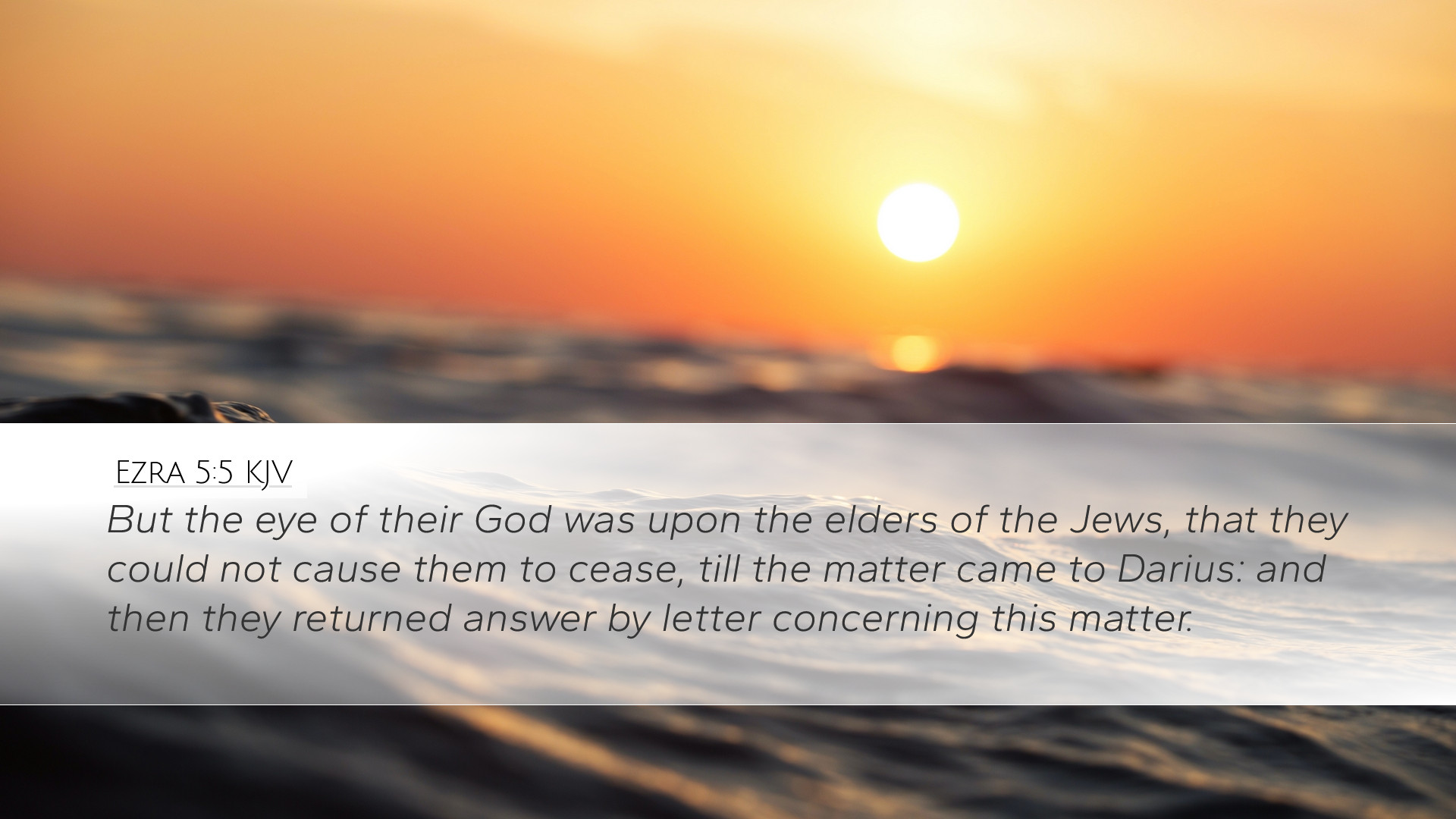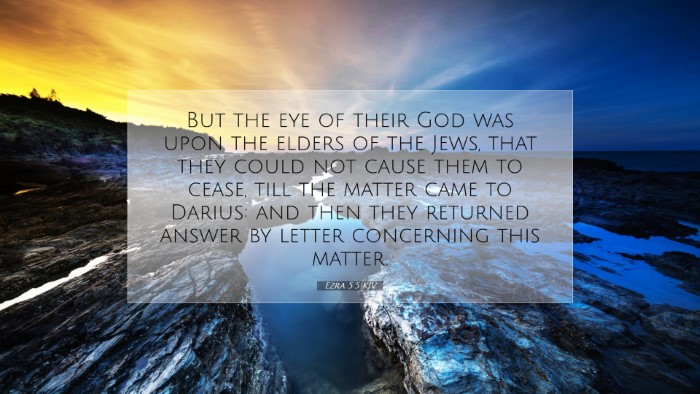Old Testament
Genesis Exodus Leviticus Numbers Deuteronomy Joshua Judges Ruth 1 Samuel 2 Samuel 1 Kings 2 Kings 1 Chronicles 2 Chronicles Ezra Nehemiah Esther Job Psalms Proverbs Ecclesiastes Song of Solomon Isaiah Jeremiah Lamentations Ezekiel Daniel Hosea Joel Amos Obadiah Jonah Micah Nahum Habakkuk Zephaniah Haggai Zechariah MalachiEzra 5:5
Ezra 5:5 KJV
But the eye of their God was upon the elders of the Jews, that they could not cause them to cease, till the matter came to Darius: and then they returned answer by letter concerning this matter.
Ezra 5:5 Bible Commentary
Commentary on Ezra 5:5
Ezra 5:5: "But the eye of their God was upon the elders of the Jews, that they could not cause them to cease till a matter came to Darius: and then they returned answer by letter concerning this matter."
Introduction
The verse under consideration serves as a pivotal moment in the Book of Ezra, illustrating the protection of God over His people during a time of opposition. Public domain commentaries, including those from Matthew Henry, Albert Barnes, and Adam Clarke, provide us rich analyses that contribute to both our understanding of the text and its implications for faith practice.
Divine Protection
Matthew Henry emphasizes the sovereignty of God, noting that “the eye of their God was upon the elders.” This exudes a profound reassurance to the faithful, highlighting that despite external pressures, God's watchful gaze secures His intended outcomes for His people.
- God's Oversight: The mention of God’s monitoring illustrates an active engagement in the lives of believers, assuring that opposition will not ultimately thwart divine purposes.
- Encouragement to Leaders: The elders of the Jews, in their leadership role, are here seen as recipients of divine favor, underscoring their importance in fostering community stability.
Resistance from Adversaries
Albert Barnes points out that even amidst fierce opposition, the rebuilding of the temple continued unabated. He notes, “Their adversaries sought to intimidate them, yet their labors were upheld by the divine assurance.” This reflects the nature of spiritual opposition where attempts to suppress God's work are met with divine resistance.
- Opposition as Normal: Barnes highlights that the attempts to cease the work were not extraordinary but typical of the struggles faced by believers throughout history.
- Continued Rebuilding: The elders persisted in their mission to rebuild the temple, which serves as an inspiring example of steadfastness in faith.
Turning to Darius
Adam Clarke provides insight into the tactical response of the elders as they engaged with Darius. By seeking a higher authority, they were practicing a form of divine wisdom. Clarke notes, “They understood the importance of appealing to authority when faced with resistance.”
- Seeking Justice: The elders’ appeal can be seen as a pursuit of justice that is aligned with God’s will, demonstrating the intersection of divine purpose and human action.
- Importance of Communication: Clarke suggests that communicating with Darius represents a strategic move that reveals an understanding of governance and the structural order established by God.
Reflections on Leadership
In this context, leadership is significant. The elders are depicted not merely as figureheads but as individuals empowered by God. Their actions and dependency on divine guidance present a model for current leaders in spiritual and secular spheres.
- Dependence on God: Leaders are reminded of their need for God’s oversight and support as they navigate challenges.
- Example of Integrity: The elders maintained integrity in their mission, demonstrating the call for leaders today to uphold righteousness amidst adversity.
The Broader Implications for the Community
The implications extend beyond individual leaders to the broader community of faith. This division reveals a communal reliance on God’s protection and unity in the face of adversity.
- Community Encouragement: The perseverance of the leaders becomes a source of encouragement for the people, challenging the community to rally behind efforts aligned with God's purposes.
- Collective Responsibility: Each member of the community plays a role in fostering a culture of resilience, mirroring the assurance that God is present with them.
Conclusion
Ezra 5:5 stands as a testimony not only to the protective power of God but also to the responsibilities of leadership and the collective nature of faith practice. Commentators like Matthew Henry, Albert Barnes, and Adam Clarke urge us to take these lessons to heart: to understand God’s oversight, to navigate adversities with wisdom, to act with integrity, and to foster strong community ties in the presence and will of God. This verse calls us to reflect on our trust in God’s protective eye, urging us to remain steadfast in our endeavors aligned with His divine purposes.


